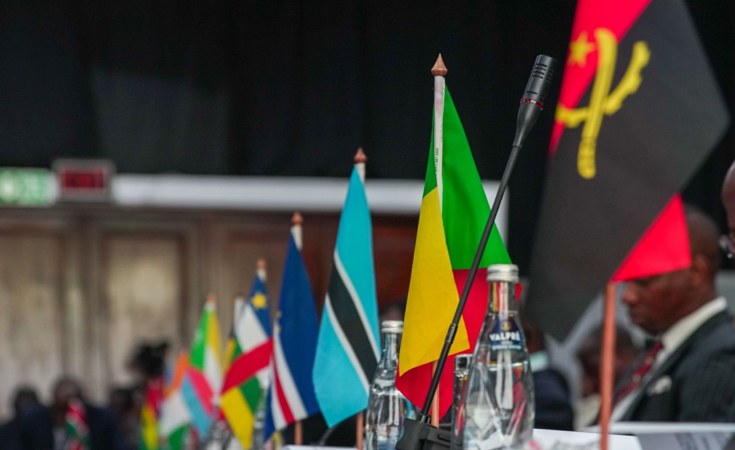Ethiopia, a country nestled in the Horn of Africa, holds significant geopolitical importance due to its strategic location and rich cultural heritage. In recent times, there has been a growing interest in revitalizing diplomatic ties between Ethiopia and the United States. One crucial step towards fostering this relationship is Ethiopia's pursuit of reclaiming its membership in the African Growth and Opportunity Act (AGOA).
Ethiopia's geographical location in the Horn of Africa has long been recognized as a key intersection point between Africa, the Middle East, and Asia. It serves as a gateway to the Red Sea, making it a significant maritime access point for global trade routes. Ethiopia's proximity to other strategic countries in the region, such as Djibouti and Eritrea, further enhances its geopolitical significance.
AGOA, enacted by the United States Congress in 2000, is a trade preference program that provides eligible African countries duty-free access to the American market for various goods. By reclaiming its AGOA membership, Ethiopia can gain access to the vast US consumer market, promoting its export-oriented industries and stimulating economic growth. AGOA membership also opens doors for increased foreign direct investment and technological exchanges, bolstering Ethiopia's industrial and agricultural sectors.
Reclaimed AGOA membership serves as a stepping stone for Ethiopia to strengthen its diplomatic relations with the United States. The two nations can engage in high-level dialogues, fostering cooperation on various fronts, including security, counter-terrorism, human rights, and regional stability. Collaborative efforts in these areas not only benefit Ethiopia and the US but also contribute to the overall peace and development of the Horn of Africa.
The United States has shown increasing interest in the Horn of Africa due to its geopolitical significance. The region's proximity to the Red Sea, vital international shipping lanes, and its potential as an energy hub make it a focal point for global powers. By actively engaging with Ethiopia and supporting its efforts to reclaim AGOA membership, the US can strengthen its presence in the region and advance its own geopolitical interests.
A recent study surveyed 169 firms in the textile sector to assess the impact of AGOA suspension, focusing on exports, job losses, investment, and supply chain disruptions. The study also considers how these effects vary between firms inside and outside industrial parks and examines the differences between AGOA utilizers and non-utilizers.
Ethiopia heavily relied on AGOA for its textile and apparel exports, with 50% of its 2020 exports to the US benefiting from AGOA. Following the suspension, the country risked losing its competitive edge in the US market due to reinstated tariffs. Notably, 30% of firms experienced decreased exports to the US, particularly those reliant on AGOA, who were more severely affected. AGOA-utilizing firms faced a more substantial impact, with 63% reporting a decrease in exports compared to only 13% of AGOA non-utilizes.
The impact of AGOA suspension varies between firms situated inside and outside industrial parks (IPs). Firms within IPs tend to face higher challenges, with 63% experiencing reduced exports to the US market in 2022, compared to 61% of firms outside IPs. This distinction may be due to the complexities of supply chains and export processes within industrial parks.
Job losses have also occurred as a result of the AGOA suspension, with 16% of firms laying off workers. Female workers have been disproportionately affected, constituting a higher percentage of those laid off. AGOA-utilizing firms were more severely affected, with 39% laying off workers, while only 13% of AGOA non-utilizers reduced employment.
The impact of job losses also varies by firm location. Among firms located outside industrial parks (non-IPs), 48% indicated diversion to the domestic markets, while only 33% inside IPs chose to increase their domestic sales. This reflects the resilience of firms within industrial parks and their ability to adapt to changing circumstances, potentially dueto the infrastructure and support available within these industrial zones.
In terms of investment, the study found that 24% of firms postponed or canceled investment plans due to the AGOA suspension. AGOA-utilizing firms were more likely to delay or cancel investments compared to non-utilizers. This indicates a negative impact on future growth and expansion opportunities for these firms.
Supply chain disruptions were another significant consequence of the AGOA suspension. About 38% of firms reported disruptions in their supply chains, affecting their production and export capabilities. Delays in receiving raw materials and inputs were the most common challenge faced by these firms.
To mitigate the negative effects of AGOA suspension, the study recommends a range of policy measures. These include diversifying export markets, strengthening domestic sales, improving infrastructure and logistics, enhancing competitiveness, and providing support to affected firms. It also suggests the need for policy coherence and coordination among various government agencies to ensure a comprehensive and effective response.
Reclaiming AGOA membership is crucial for Ethiopia's economic recovery and growth in the textile and apparel sector. It not only provides access to the US market but also signals a commitment to international trade and economic cooperation. By reinstating Ethiopia's AGOA eligibility, the United States can support the country's efforts to revive its export-oriented industries, create jobs, and improve livelihoods.
Furthermore, reclaiming AGOA membership would contribute to strengthening the diplomatic ties between Ethiopia and the United States. It would pave the way for increased engagement and cooperation on various regional and global issues of mutual interest, reinforcing stability and development in the Horn of Africa.
In conclusion, Ethiopia's pursuit of reclaiming AGOA membership holds significant potential for fostering economic cooperation and strengthening diplomatic ties between Ethiopia and the United States. Reinstating Ethiopia's AGOA eligibility would not only support the country's economic recovery but also contribute to regional stability and development.
Editor's Note: The views entertained in this article do not necessarily reflect the stance of The Ethiopian Herald


